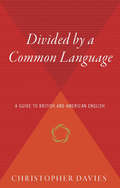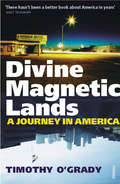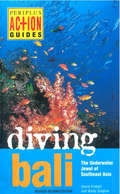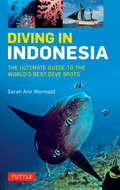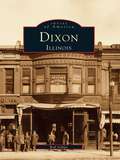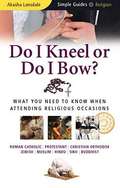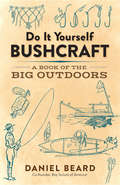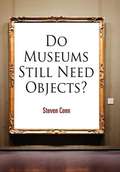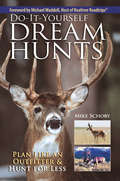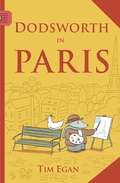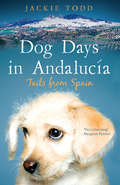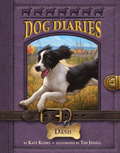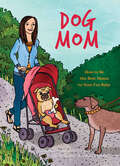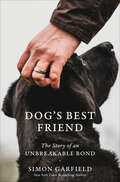- Table View
- List View
Divided by a Common Language: A Guide to British and American English
by Christopher DaviesThis guide to the language differences between the United States and United Kingdom is “a fascinating collection full of all kinds of surprises” (Minneapolis Star Tribune).Taxi rank . . . toad in the hole . . . dustman . . . fancy dress . . . American visitors to London (or viewers of British TV shows) might be confused by these terms. But most Britons would be equally puzzled by words like caboose, bleachers, and busboy. In Divided by a Common Language, Christopher Davies explains these expressions and discusses the many differences in pronunciation, spelling, and vocabulary between British and American English.He compares the customs, manners, and practical details of daily life in the United Kingdom and the United States, and American readers will enjoy his account of American culture as seen through an Englishman’s eyes. Davies tops it off with an amusing list of expressions that sound innocent enough in one country but make quite the opposite impression in the other. Two large glossaries help travelers translate from one variety of English to the other, and additional lists explain the distinctive words of Australia, New Zealand, and South Africa. This delightful book is the ideal companion for travelers—or anyone who enjoys the many nuances of language.
Divine Magnetic Lands: A Journey in America
by Timothy O'GradyIn 1973, aged twenty-two, Timothy O'Grady left America. For the next thirty years he lived in and wrote about Europe. As he did, the American counter-culture crashed, Ronald Reagan came and went, wars were declared and the country was attacked by air. Much of the world began to look at America in a new way, wondering what had happened to it and where it was going. Among them was Timothy O'Grady, and he decided to go back and investigate.He went out onto the American road, travelling over fifteen thousand miles through thirty-five states. He met academics, the homeless, war veterans, political activists, New Orleans rappers, billionaires, novelists and a Ku Klux Klansman. In every bar he stopped in, it seemed, there was a story of American life to be heard.
Diving Bali
by Wally Siagian David PickellFor this new edition of Diving Bali, maps and images have been added, and the text has been revised throughout to incorporate new oceanographic data and changing conditions on the island's reefs. The result is an entertaining and essential resource that provides a wide-ranging exploration--oceanographic, geological, biological, historical, and even cultural--of Bali's dive sites and diving community.
Diving Bali
by Wally Siagian David PickellFor this new edition of Diving Bali, maps and images have been added, and the text has been revised throughout to incorporate new oceanographic data and changing conditions on the island's reefs. The result is an entertaining and essential resource that provides a wide-ranging exploration--oceanographic, geological, biological, historical, and even cultural--of Bali's dive sites and diving community.
Diving and Snorkeling Belize
by Mark WebsterGuide to skin-diving, scuba-diving, and snorkeling at Belize
Diving in Indonesia: Bali, Komodo, Sulawesi, Papua, and more
by Sarah Ann WormaldDiving in Indonesia is a fully comprehensive diving guidebook for exploring the most notable areas of Indonesia. A chapter is devoted to each of the following important regions in Indonesia for divers: Bali North Sulawesi Central, South and Southeast Sulawesi Nusa Teggara (Lombok, Komodo, Timor, Alor) Raja Ampat & West Papua Maluku (Ambon, Banda & Halmahera) Each chapter relates to a different region and provides the reader with area maps, dive site maps, diving information which includes: Difficulty level highlights Logistics General area information General diving information Detailed dive site descriptions Useful diving contacts such as emergency services and emergency diving services, liveaboard diving, marine life features, conservation features and travel planners are included, making this a complete guide. There are also sections regarding general travel practicalities in Indonesia, general diving practicalities in Indonesia, a basic Indonesian dictionary and phrases specifically relating to diving.
Divorce Turkish Style
by Ruth Whitehouse Esmahan AykolPraise for Esmahan Aykol:"Kati could be the love child of Miss Marple and NPR's Andrei Codrescu. It doesn't matter who done it. What matters is that Aykol uses the genre to tell us more about the world than we're used to."--Newsday"An offbeat amateur sleuth with a distinctive narrative voice. Fans of Amanda Cross's Kate Fansler and Kerry Greenwood's Phryne Fisher will find a lot to like."--Publishers WeeklyKati owns Istanbul's only mystery book store and, as usual, gets involved in a case that is none of her business. Every day, a beautiful woman lunches alone in the restaurant next to the bookstore. When the woman is found dead in her apartment, Kati immediately recognizes the stranger from the restaurant in images in the newspaper photos. Although the police believe it was an accident, Kati suspects something more sinister has happened. Sani Ankaraligil was an attractive young woman and a politically active ecologist in the middle of a divorce from her wealthy husband. So who would benefit from her death? The industrial companies Sani had accused of polluting the rivers of western Turkey, or her jealous husband seeking revenge through an honor killing, or a Thracian separatist group? The investigation pulls Kati into murkier waters: the marriage may have been a sham, designed to cover up Sani's husband's homosexuality . . . the role of her mother-in-law goes from distasteful to outright criminal.
Dixie Highway in Illinois, The
by James R. WrightThe Dixie Highway, once a main thoroughfare from Chicago to Miami, was part of an improved network of roads traversing the landscape of 10 states. A product of the Good Roads Movement of the early 20th century, construction on the highway in Illinois took place from 1916 to 1921. When completed in 1921, the Dixie Highway was the longest continuous paved road in the state. It ran through parts of Cook, Will, Kankakee, Iroquois, and Vermilion Counties, with service stations, roadside diners, and campgrounds sprouting up along the way. With over 200 vintage photographs, The Dixie Highway in Illinois takes readers on a tour from the Art Institute of Chicago, in the heart of the city on Michigan Avenue, to the Illinois state line east of Danville, exploring this historic highway and the communities it passes through.
Dixon, Illinois (Images of America)
by Bob GiblerThis fascinating new addition to the Images ofAmerica series offers a glimpse into the uniquehistory of Dixon, Illinois, with the use of over 200 historic photographs. In the spring of 1830, John Dixon settled with his family near the Rock River in Northern Illinois. Dixon, Illinois, soon grew as men crossed the river here on their way to work in the mines at Galena. In 1832, the Black Hawk War brought a number of now-famous men to this remote outpost of civilization. Winfield Scott, Zachary Taylor, Robert Anderson, Abraham Lincoln, and Jefferson Davis were all here, each of them equally unconscious of future immortal honors. The act of the Illinois General Assembly creating Lee County was approved February 27, 1839, with Dixon officially becoming the county seat on May 31, 1839. Dixon was on its way to fast becoming a central point in Illinois, well known for its industry, beautiful scenery, and the enchantment of the Rock River Valley.
Do I Kneel or Do I Bow?
by Akasha LonsdaleIn today's multicultural society we are increasingly likely to meet and become friends with people from different religious backgrounds, and to find ourselves attending an unfamiliar ceremony. When this happens, there can be few of us who know exactly what to expect, or are confident about how to behave. This book will help you: * to understand the backgrounds to the key festivals, ceremonies, and practices of the major world religions* to participate in the main holidays and festivals of the different religious calendars* to know what to expect and how to behave when invited to attend a Protestant, Catholic, Christian Orthodox, Jewish, Muslim, Hindu, Sikh, or Buddhist service* to join in the family celebrations of friends from different backgrounds. Armed with this basic information, you will feel relaxed enough to enjoy the occasion-and perhaps inspired to discover more about the spiritual world view of another cultural tradition.
Do It Yourself Bushcraft: A Book of the Big Outdoors
by Daniel BeardBoy Scouts co-founder and avid outdoorsman "Uncle Dan" Beard provides a clear, enthusiastic introduction to the joys of camping, trapping, and outdoor survival. Originally published nearly a century ago, this engagingly written and charmingly illustrated guide provides an atmospheric reminder of a simpler time. Filled with timeless wisdom on conversing with nature, the book also constitutes a source of practical tips, offering advice on fishing, canoeing, and other aspects of outdoor life. Fishing-related instruction includes information on how to catch minnows, how to make a dip net, fly fishing, bait casting, and much more. Readers can learn how to stalk, to photograph, and even to capture wild animals with their bare hands. They'll also discover how to build a canvas canoe and a dugout canoe, how to make a portage, how to handle a canoe, how to row a boat, and the names of all the parts of boats. This ageless volume will prove a helpful companion to hunters, fishermen, campers, backpackers, Scouts, and anyone who enjoys outdoor recreation and the thrill of bushcraft.
Do Museums Still Need Objects?
by Steven Conn"We live in a museum age," writes Steven Conn in Do Museums Still Need Objects? And indeed, at the turn of the twenty-first century, more people are visiting museums than ever before. There are now over 17,500 accredited museums in the United States, averaging approximately 865 million visits a year, more than two million visits a day. New museums have proliferated across the cultural landscape even as older ones have undergone transformational additions: from the Museum of Modern Art and the Morgan in New York to the High in Atlanta and the Getty in Los Angeles. If the golden age of museum-building came a century ago, when the Metropolitan Museum of Art, the American Museum of Natural History, the Philadelphia Museum of Art, the Field Museum of Natural History, and others were created, then it is fair to say that in the last generation we have witnessed a second golden age.By closely observing the cultural, intellectual, and political roles that museums play in contemporary society, while also delving deeply into their institutional histories, historian Steven Conn demonstrates that museums are no longer seen simply as houses for collections of objects. Conn ranges across a wide variety of museum types--from art and anthropology to science and commercial museums--asking questions about the relationship between museums and knowledge, about the connection between culture and politics, about the role of museums in representing non-Western societies, and about public institutions and the changing nature of their constituencies. Elegantly written and deeply researched, Do Museums Still Need Objects? is essential reading for historians, museum professionals, and those who love to visit museums.
Do Your Best: How to be a Scout
by Bear GryllsWhat more could you ask for, than a book stuffed like an overfilled rucksack with tips and tricks from one of the world's most celebrated adventurers from pitching a tent, leading a team, how to keep fit, tie knots, memorise facts, identify trees, stars and birds, as well as learning real survival skills like putting up a tent in the wild and stashing your breakfast in ground to keep it hot for the next morning?This is the book for anyone who is a Scout, was a Scout, or wants to be a Scout.Do Your Best is the handbook for every Scout, young and old. It's a warm-hearted book in which you'll learn all the skills the scouts use to do their best in everything they do and set themselves up to face life head-on and make a real difference in the world.Not since Scouting for Boys, the seminal 1908 book by Robert Baden-Powell that sparked the global movement, has there been a single handbook for every Scout. Whoever you are it will help you step up, speak up, skill up and dream big.Grab life with both hands, never give up and give life you your best shot with Do Your Best: How To Be a Scout. Stunningly typograhically designed and richly illustrated, this will be the perfect Christmas gift for the adventurer in your life -- young or old.Chapters include: 'How to Survive'; 'How to give first aid'; 'How to protect our planet'; 'How to be organised'; 'How to be an adventurer'; 'How to be a camp cook'; 'How to live freely'; 'How to predict the weather'; 'How to be a team player'. And that's just for starters!
Do Your Best: How to be a Scout
by Bear GryllsWhat more could you ask for, than a book stuffed like an overfilled rucksack with tips and tricks from one of the world's most celebrated adventurers from pitching a tent, leading a team, how to keep fit, tie knots, memorise facts, identify trees, stars and birds, as well as learning real survival skills like putting up a tent in the wild and stashing your breakfast in ground to keep it hot for the next morning?This is the book for anyone who is a Scout, was a Scout, or wants to be a Scout.Do Your Best is the handbook for every Scout, young and old. It's a warm-hearted book in which you'll learn all the skills the scouts use to do their best in everything they do and set themselves up to face life head-on and make a real difference in the world.Not since Scouting for Boys, the seminal 1908 book by Robert Baden-Powell that sparked the global movement, has there been a single handbook for every Scout. Whoever you are it will help you step up, speak up, skill up and dream big.Grab life with both hands, never give up and give life you your best shot with Do Your Best: How To Be a Scout. Stunningly typograhically designed and richly illustrated, this will be the perfect Christmas gift for the adventurer in your life -- young or old.Chapters include: 'How to Survive'; 'How to give first aid'; 'How to protect our planet'; 'How to be organised'; 'How to be an adventurer'; 'How to be a camp cook'; 'How to live freely'; 'How to predict the weather'; 'How to be a team player'. And that's just for starters!
Do-It-Yourself Dream Hunts: Plan Like an Outfitter and Hunt for Less
by Mike SchobyTake your hunting to new heights!With Do-It-Yourself Dream Hunts, you will learn the tips and tricks to arranging an affordable first-rate hunt. This book provides a state-by-state guide to license costs (including Canada), and goes on to cover firearm selection, advice for legally accessing private land, exploring public lands or leasing land, getting a tag, transporting meat and trophy home after the hunt, and training for the big hunt.Provides answers to questions surrounding the most popular outdoor web forums on Cabela's, Bass Pro Shops, and Hunting.NetDelivers savvy tips and insider insight to help you achieve a big game hunt for 40-60 percent less than the average cost of $5000 - $8000 that a fully outfitted hunt costs
Doctor Grundy's Undies
by Dawn McMillanA strong gust of wind sweeps Doctor Grundy's best undies—brand-new, and decorated with tiger stripes and tiger eyes off the clothesline. The unusual undergarments go flapping out to sea and across many different lands. Who will get to keep them? A cracked crew of pirates? A silly Scottish bagpiper? You'll find out in this fun-filled and irreverent world tour. The adventure is XXL, just like the fabulous undies, and loaded with clever rhymes and winsome pictures by the bestselling team of storyteller Dawn McMillan and illustrator Ross Kinnaird, the cheeky creators of I Need A New Butt!
Doctor in the Andes
by Dana JamesWhen Dr Kara Noreno's husband dies, she is left on her own to run the clinic they have established in the foothills of the Andes. But pressure from her late husband's family and antagonism from local trouble-makers are undermining her efforts. Assistance arrives in the form of Dr Ross Hallam, who soon proves indispensible, both to the clinic and to Kara's lonely heart. But how can she tell him she loves him when she knows that Ross, like everyone else, will leave?
Dodge City (Stagecoach Station, # #1)
by Hank MitchumThe massive Concord stage thundered across the empty lawless miles of the Great Plains bound for the wickedest town in the West--Dodge City. It was a wide-open cattle town always itching for a fight, and a big one was about to start. For Burl Channing was on this stage, a Federal marshal hell-bent on a mission of personal vengeance to bring a vicious murderer to justice. The man he seeks is Frank Killian, a cunning gambler with a killer's finely honed edge. Frightened of one man and betrayed by the other, Emily Barker, a beautiful young widow, is suddenly caught up in their struggle -- a battle that will soon explode in front of the legendary Long Branch Saloon in one of Dodge City's deadliest gunf ights.
Dodsworth in Paris (Fountas & Pinnell LLI Blue: Level L)
by Tim EganDodsworth and his (crazy) friend the duck have just arrived in Paris. It is their first time in the City of Lights, and they are ready for some adventures magnifique! Right away they see mimes, painters, and people wearing berets. They climb the Eiffel Tower, and the duck even finds some bent-over guy who rings bells for a living. It looks like it is going to turn out to be a great vacation in Paris . . . but trouble is never far from a misbehaving duck!
Dog Days in Andalucía: Tails from Spain
by Jackie ToddIt was love at first sight: the huge pale-green eyes, the ruffled tawny hair and the cute way he held his head to one side. What really swung it, though, was his feet being way too big for his body, his ears too big for his head and that, while trying to look brave, he was obviously terrified. Charly was the first of what grew to be a large family of abandoned Spanish dogs taken in by Jackie Todd and her husband Stephen after they emigrated in 1997 to Frigiliana, a picturesque Spanish village in Andalucia. By the time Charly was four, something magical had happened: the people of the village had become close friends and the Todds' memories of their old lives were as weak as British sunshine.Fourteen years on from that first arrival they have ten dogs and eight cats of their own and regularly foster tiny strays that need bottle-feeding until they can be found homes. In 2007, 123 puppies and kittens passed through their door; in 2008, it was 119; and the tragic procession continues today.Millions of people dream of turning their summer holiday into permanent reality. Dog Days in Andalucía is the heart-warming and inspirational story of an ordinary British couple who did just that, making a mighty impression on the village, its people and its surrounding animal population along the way.
Dog Diaries #5: Dash
by Kate Klimo Tim JessellA dog's-eye view of the Mayflower voyage and the first Thanksgiving at Plymouth Colony!English springer spaniel Dash and his furry friend Mercy--a mastiff--travel with their master, John Goodman, in search of the New World. Taken from the pages of history, this Dog Diary follows the story of the colonists whom we now call Pilgrims, from their sixty-six-day voyage at sea to the celebration of their first harvest with the Wampanoag Indians who become their friends and advisors. With realistic black-and-white illustrations by Tim Jessell and an appendix including information about the Mayflower, Plymouth Colony, springer spaniels, and the primary sources on which the book is based, this is historical fiction that dog-loving middle graders--and educators--can be truly thankful for!
Dog Mom: How to be the Best Mama to Your Fur Baby
by Christine Amorose MerrillA guide to spoiling your fur baby with everything a dog could ever want!Your pup is far more than a pet and you’re proud to admit it. What could be better than a best friend who will literally lick away your tears, make you laugh with crazy antics all day, and snuggle with you all night? This handbook for pup parenting goes beyond the basics to focus on building a strong and happy bond and treating your baby not just as a pet but as a full-fledged member of the family. A top-notch dog mother knows that it’s all about:• Discovering far-off lands together• Brunching with other moms and pups• Spoiling with homemade treats and new toys• Having regular conversations, including in public• And so much more!
Dog's Best Friend: The Story of an Unbreakable Bond
by Simon Garfield“A fascinating, informative and highly entertaining expedition through the highways and byways of dogdom.” —John Bradshaw, New York Times bestselling author of Dog SenseA charming meditation on the relationship between humans and dogs, drawing upon history, science, art, and personal experience to illuminate a magical bond that has endured millennia—from the New York Times bestselling author of Just My Type.“Ludo is now an elderly gentleman, and we would do almost anything to ensure his continued happiness. We schedule our days around his needs—his mealtimes, his walks, the delivery of his life-saving medication (he has epilepsy, poor love). We spend a bizarrely large amount of our disposable income on him, and he never sends a card of thanks. When he’s not with us for a few days, the house feels extraordinarily empty. I feel so fortunate to know him.”Ludo is a dog—Simon Garfield’s beloved black Labrador retriever, one of millions of canines who have become integral parts of our lives. But how did the dog become top dog? How did these faithful animals come to assist us not only in hunting, but in bomb disposal and cancer detection—and ultimately become our closest companions? Dog’s Best Friend examines how this bond developed over the centuries, and how it has transformed countless lives, both human and canine.Garfield begins with the earliest visual representations—dogs depicted in ancient rock art—and ends at the laboratory that first sequenced the canine genome. Along the way, we meet the legendary Corgis of Buckingham Palace, the dogs of the Soviet space program, the world’s first labradoodle, and a border collie that can identify more than a thousand different plush toys. Garfield reveals the secrets of the world’s best dog trainers, takes us inside the wild world of dog breeding and dog shows, and unearths the deep psychological roots of the human-dog link. And Ludo pops his snout in from time to time as well.A celebration of this deep interspecies connection, delivered with Simon Garfield’s inimitable wit, Dog’s Best Friend offers delights and insights for anyone who has ever loved a dog.
Dog-Friendly Hikes in Maine: Plus Parks, Beaches, Eateries, and Lodging
by Aislinn SarnackiToday, more and more people travel with their pets, taking their beloved four-legged friends everywhere. Yet, it can still be sometimes difficult to find a park or hiking trail that's dog-friendly. Bangor Daily News outdoors columnist Aislinn Sarnacki presents 35 hikes around Maine that you can feel comfortable taking your dog on. Along with maps and color photos to detail the hikes, she includes practical information such as proper etiquette to observe with your canine companion and when it's okay to let your pet off the leash. She also rounds out with helpful suggestions on dog-friendly restaurants, hotels, parks, and beaches, so you and your furry friend can make the most of your time in the Maine outdoors.
Dog-Friendly New England: A Traveler's Companion (Third) (Dog-Friendly Series)
by Ginger Warder Trisha BlanchetPlanning to bring your pup with you to New England? If so, this book will be your second most trusted companion. Completely revised and updated, this bestseller covers dog-friendly attractions, activities, lodgings, restaurants, and more. There are so many places to go in the northeastern US where your dog is also welcome, and Blanchet and Warder have found the best of them throughout all the New England states. Replete with new listings, entries include a wide array of details to help you and your dog choose where to roam. Included are restaurants that allow dogs in their outdoor seating areas; dog-friendly bookstores, historic sites, and recreational trails; doggie daycares and boutiques; dog parks; veterinary services; pet stores; and helpful organizations such as animal shelters and humane societies. This popular guide will be an invaluable resource for anyone exploring New England with a canine companion.
